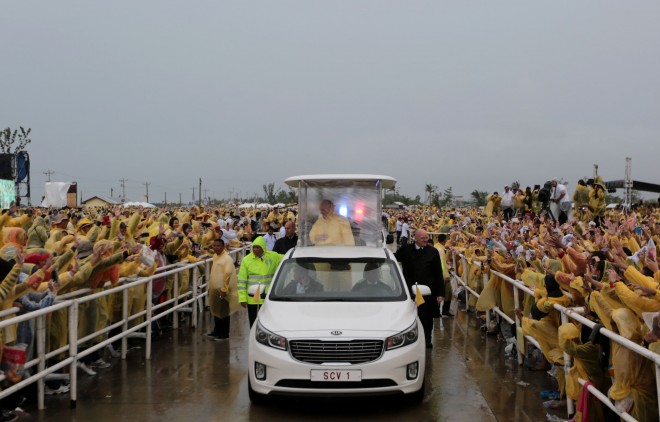
Pope Francis, wearing raincoat, blesses the crowd after the mass near the Tacloban Airport, Saturday, January 17, 2015, enroute to Palo, Leyte to visit families of typhoon Yolanda victims. Leyte and the nearby provinces is under typhoon signal number 2 when the Pope arrived. (Photo by Benhur Arcayan/Malacanang Photo Bureau)
MANILA, Philippines–A tropical storm called “Father” [“Amang”] came and went with the leader of the Catholic Church, Pope Francis.
Just as it entered the Philippine area of responsibility as the Pope was set to arrive last Thursday night, Tropical Storm Amang dissipated just before the Pontiff was to depart for Rome Monday morning.
Instead of the rain forecast for Metro Manila and a wide area of Luzon, clear skies and a warm sun shone on thousands of Filipinos who came out to the streets to catch a last glimpse of the Pope as he made his way to his plane at Villamor Air Base.
“It was just a coincidence with the papal visit,” said weather forecaster Benison Estareja of the Philippine Atmospheric, Geophysical Astronomical Services Administration (Pagasa).
Amang, however, still wreaked havoc on the Bicol region, killing two persons—in Catanduanes and Camarines Norte—and destroying houses and roads due to landslides.
Heavy rain on Sunday caused rivers to overflow and mudslides to bury the homes of over 100 families in Manito and Guinobatan, Albay.
In Camarines Norte, Arlene Aguilar, 49, was in her sari-sari store when she was crushed by boulders that had tumbled down a slope in Barangay (village) Tawig, Paracale town, at 11 a.m. Sunday.
Her daughter Rona, 17, survived with minor injuries, SPO1 Michael Surla, Paracale police investigator, said.
In Catanduanes, rice farmer Domingo Tablate, 69, drowned in his ricefield in Virac at 3 a.m. after a nearby river overflowed, said Capt. Mardjorie Panesa, public information officer of the 9th Infantry Division.
Tablate of Barangay Antipolo Norte was initially reported missing on Sunday after he tried to secure his cow against the wind and rain. His body was recovered around 7 a.m. by Red Cross personnel and barangay officials.
Pagasa said it was also coincidence the first storm to hit the country this year had come this early.
Sunday also saw a record of sorts—along with the biggest crowd to hear a papal Mass at Rizal Park—when the weather remained at a cool 22 degrees Celsius in Metro Manila all day, Estareja said.
He said the temperature in Metro Manila ranged from 22 degrees at 6 a.m. to 22.8 degrees at 8 p.m.
“It was the lowest maximum temperature recorded since the start of the northeast monsoon in October,” he said.
He said Pagasa had forecast Amang to gradually weaken as it moved northwestward along the eastern Luzon seaboard, but they did not expect that it would dissipate so soon.
“The nature of the storm was that it would gradually weaken after it made landfall in Bicol. The northeast monsoon would also hasten its weakening. But not so soon,” Estareja said.
Pagasa had forecast rains and gusty winds in Metro Manila and several Luzon provinces on Monday after Amang (international name: “Mekkhala”) pounded Samar and Leyte provinces and the Bicol region on the weekend.
The approaching storm on Saturday forced the Pope to cut short his visit with the victims of Supertyphoon “Yolanda” in Tacloban City and Palo, Leyte, by four hours and fly back to Manila.
On Sunday, as Francis celebrated Mass at Rizal Park, it rained for most of the day but millions of faithful still turned out.
The rains were expected to continue the next day when the Pope was scheduled to leave, but by late Sunday night, the storm had weakened to a tropical depression. By Monday morning, it further weakened to a low pressure area.–With reports from Ma. April Mier, Michael Jaucian and Shiena Barrameda, Inquirer Southern Luzon